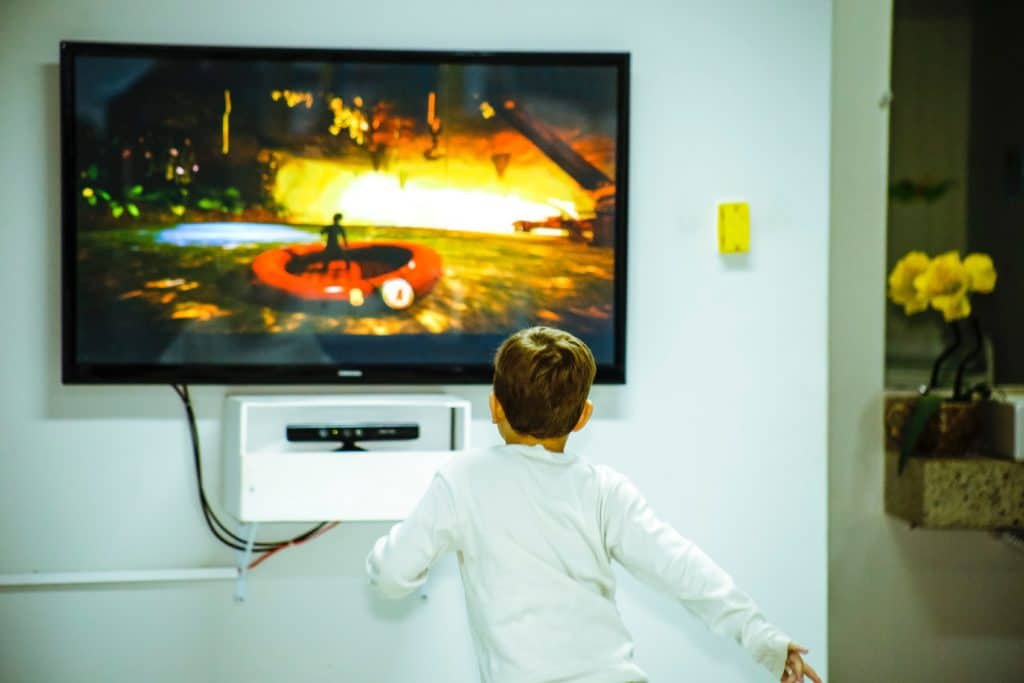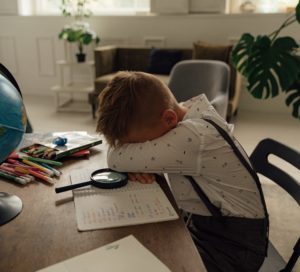Has your child ever had an epic freakout because you demanded that they turn off their screen? Or completely went unhinged when you wouldn’t buy them a video game they wanted or allowed social media before you thought they were ready? It turns out that there is a neurological reason for that reaction beyond child entitlement and fragility. Too much screen time can result in overstimulation that results in short- and long-term effects in kids. To help manage your child’s screen time and avoid overstimulation, check out our Screen Safety Essentials Course. This course will help your family achieve screen sanity with our weekly parenting and family coaching videos featuring research-based tools from Dr. Tracy Bennett. In this article, we discuss sensory overload, how it may be affecting your children, and how to avoid it.
Our Digital Babysitter
Raising kids is hard! And some kids are more difficult to entertain than others. Screen time can be a win-win – kids are happy, and parents can get things done. Dr. Bennett, Founder of GetKidsInternetSafe, says screen time can be a great thing, but it can also be a source for a host of digital injury. In her book Screen Time in the Mean Time, she describes screen injuries in the areas of health, interpersonal exploitation, and financial exploitation.[4]
She says that, although screen time matters, content matters too. Educational content with a calm, predictable, and sequential pace is easier for children to process than frenetic, fast-paced content. If your child melts down when you tell them to turn off screen time, you may need to be more aware of the content they are watching so they don’t suffer from sensory overload.
What is sensory overload?
Sensory overload refers to overstimulation that occurs when sensations from the environment, like playing video games or watching fast-paced videos and television programming, can become overwhelming.[2] For young children with maturing brains and difficulty with emotional modulation, sensory overload from unmanaged screen time can result in irritability, temper outbursts, hyperactivity, and aggression. Children with disabilities, like autistic spectrum disorder or attention-deficit/hyperactivity disorder, are particularly vulnerable to sensory overload.[4]
What does frenetic, fast-paced content look like?
In 2006, YouTube launched the child educational program CoComelon. By September 2022, CoComelon had 144 million subscribers and over 139.24 billion views.[5] The demand and popularity of the CoComelon led to the creation of the TV show in 2021, which also became a hit sensation. CoComelon consistently ranks in the top ten most popular shows on Netflix.
CoComelon is known for its fast pace and bright animation. These aspects of the program are hypothesized to stimulate the release of the feel-good chemical, dopamine, in kids’ brains.[1] Dopamine also plays a key role in addiction. This rush of dopamine that kids experience while watching the show is what makes them want to watch it repeatedly.[3] Some exposure is likely harmless. However, some kids may have a vulnerability to such fast-paced content. Too much watching can lead to problems.
Passive television while doing homework can result in sensory overload.
Frenetic screen content isn’t the only thing that can lead to problems with sensory overload. In her book, Screen Time in the Mean Time, Dr. Bennett writes that passive television can also strain child cognitive resources.
Passive television refers to the television playing in the background while we’re eating dinner, doing homework, or just for pleasure. Having the television on in the background while your kids do homework creates a battleground for your child’s attention. This can negatively affect their quality of learning and academic performance.
Dr. Tracy Bennett writes:
Watching TV and doing homework are both demanding tasks that compete for visual and verbal cognitive processing. As a result, the toggling required to attend to both tasks will impair learning and homework quality. Research studies have demonstrated that watching television, or even just having it on i
Entertainment and big tech have commodified your child’s attention.
Because entertainment corporations recognize that their profit depends on our screen time, they’ve created manipulative technology to capture our attention. With features like autoplay, companies like Netflix, YouTube, and TikTok know how to keep us binge-watching. The autoplay feature automatically dishes up new content without user input to promote addictive watching habits. With features like autoplay, can you be confident that Netflix is prioritizing your child’s learning and mental health over its profit?
Signs That Your Child May be Suffering from Sensory Overload
- Chronic moodiness and irritability
- Fatigue and low energy
- Difficulty making decisions
- Temper outbursts, especially after a long screen time binge
- Aggression
- Headaches, including ocular headaches and migraines
- Difficulty falling asleep and staying asleep
- Nightmares[6]
How can you help your child avoid sensory overload?
- Prioritize face-to-face family time and screen safety conversations with help from our Connected Family Screen Agreement and our GKIS Blog.
- Take initiative and manage what your children are able to access with help from our Screen Safety Toolkit.
- Set up sensible household rules (like screen-free zones) and amazing learning centers with help from our Connected Family Course.
- Help your children learn how to recognize the red flags of digital injury and practice psychological wellness tools before they adopt social media with our Social Media Readiness Course.
- Opt for the works with our megacourse the Screen Safety Essentials Course. This low-cost option offers all GKIS Courses and Agreements in one easy place. Parents-only videos and family videos from Dr. B offer 26 easy lessons that you can sprinkle in once a week to make sure you cover everything!
- Share Dr. B’s important teachings by telling your school, church, or temple about her custom webinars!
- If you need extra support, check out our GKIS Workshops and Dr. B’s Coaching options!
Thanks to CSUCI intern, Sarah Hernandez for researching and writing about sensory overload from screen time.
I’m the mom psychologist who will help you GetKidsInternetSafe.
Onward to More Awesome Parenting,
Tracy S. Bennett, Ph.D.
Mom, Clinical Psychologist, CSUCI Adjunct Faculty
GetKidsInternetSafe.com
Works Cited
[1] The Kangaroo Forest. (2022). Is CoComelon overstimulating. Woodlands Online. https://www.woodlandsonline.com/blps/article.cfm?page=10208
[2] Gordon, S. (2021). How to cope with your child’s sensory overload. Very Well Family. https://www.verywellfamily.com/overstimulation-in-children-4585143
[3] Maguire, C. (2017). 6 negative effects for children playing video games. Washington Parent. https://washingtonparent.com/6-negative-effects-for-children-playing-video-games/
[4] Bennett, T. (2019). Screen time in the meantime: A parenting guide to get kids and teens internet safe. GetKidsInternetSafe Books. https://getkidsinternetsafe.com/parenting-guide/
[5] CoComelon. (2022). YouTube. https://youtube.com/channel/UCbCmjCuTUZos6lnko4u57UQ
[6] Eatough, E. (2021). What is sensory overload? Know how to deal with overstimulation. BetterUp. https://www.betterup.com/blog/sensory-overload
Photo Credits
Photo by Vidal Balielo Jr.: https://www.pexels.com/photo/boy-standing-in-front-of-flat-screen-tv-1682519/
Photo by ANTONI SHKRABA: https://www.pexels.com/photo/a-boy-leaning-his-head-on-the-table-5306486/
Photo by August de Richelieu: https://www.pexels.com/photo/little-girl-doing-her-homework-4260486/



